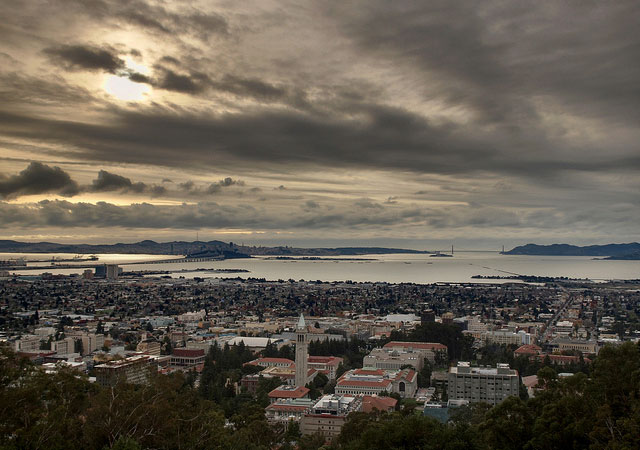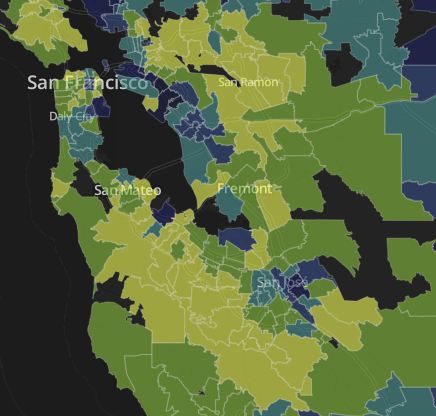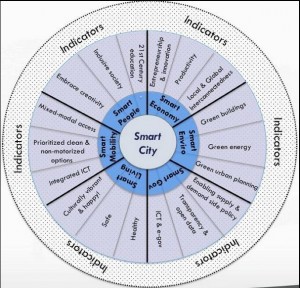
We know, we know. There are a lot of rich, smart people around here. Not that we're boasting.
But consider some of the recent supporting evidence: Earlier this week, the Washington Post reported on "Super Zips," ZIP codes ranking highest on residents' income and college education. Two of the nation's largest collections of contiguous Super Zips are found in the South Bay (No. 3) and East Bay (No. 5). And if that's note enough to convince you we're darn special, check out Fast Company's list of the smartest U.S. cities: San Francisco tied for second with Boston (Seattle is ranked No. 1). The magazine defines "smart" as "doing the most to become the sustainable, connected, innovative city of the future."
Using the latest census data, the Post ranked ZIP codes from 0 to 99, representing the average of each area’s percentile rankings for median household income and for the share of adults with college degrees. Those with a rank of 95 or higher are "Super Zips" (the phrase was coined by Charles Murray, an American Enterprise Institute scholar and author). Typical household income in one of the 650 Super Zips is $120,272, and 68 percent of adults hold college degrees. By comparison, household income in the remaining 23,925 zips is $53,962, with 27 percent holding college degrees.
Some Super Zip numbers are way higher than others, of course. Atherton, for example, tallies a median household income of $240,833, and 82 percent of Athertonians are college grads.

The Post story that accompanies its Super Zip map notes that the clustering of the educated wealthy has been increasing, and is resulting in deeper stratification of socioeconomic classes:
Although the wealthiest Americans have always lived in their own islands of privilege, sociologists and demographers say the degree to which today’s professional class resides in a world apart is a departure from earlier generations. People of widely different incomes and professions commonly lived close enough that they mingled at stores, sports arenas and school. In an era in which women had fewer educational and professional opportunities, lawyers married secretaries and doctors married nurses. Now, lawyers and doctors marry each other.
A recent analysis of census data by sociologists Sean Reardon of Stanford and Kendra Bischoff of Cornell highlighted how middle-income neighborhoods have been fading away as more people live in areas that are either poor or affluent.
In 1970, 65 percent of families lived in middle-income neighborhoods; four decades later, 42 percent did.
Meanwhile, the share of families living in affluent neighborhoods doubled, from 7 percent to 15 percent, as did families living in poor neighborhoods, from 8 percent to 18 percent.
The trend toward stratification is not a positive one, say sociologists, in part because it impedes the upward mobility that has always been a part of the American Dream. Again from the Post story:
As the affluent become more isolated, the working class and the poor become confined “to communities where no one has a college education and no one has connections to the world,” said Stephen Klineberg, a Rice University sociologist. “The social capital that’s so necessary for upward mobility is more difficult to come by than it was in the old days when there was broad-based prosperity.”
And, the Post notes, the impact on children, particularly those from affluent families who grow up knowing only their privileged world, could be substantial and long-lasting:
“We ought to worry about what this means for society when kids who are the most advantaged don’t grow up with much experience or understanding of how the other 95 percent live, particularly the bottom half,” said Reardon, who studies the consequences of income inequality. “Will they be less empathetic? Do they understand what it’s like to grow up poor?”
But let us move on to smartness. This is the third year that Fast Company has ranked cities according to their "broad, integrated approach to improving the efficiency of city operations, the quality of life for its citizens, and growing the local economy." Author Boyd Cohen has even developed a rubric for smart cities, which he calls the Smart Cities Wheel.

As the story points out, portentously, "The survival of our species on planet earth is largely going to be determined by what happens in our cities. By 2050, 70 percent of the world's population will live in them. We are observing a mass migration to cities at an unprecedented rate. The growing urbanization places high demands on infrastructure such as transportation and building as well as increased demand for resources such as food, water, and energy."